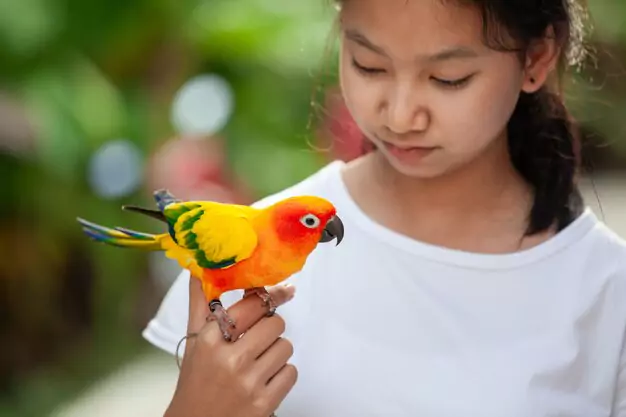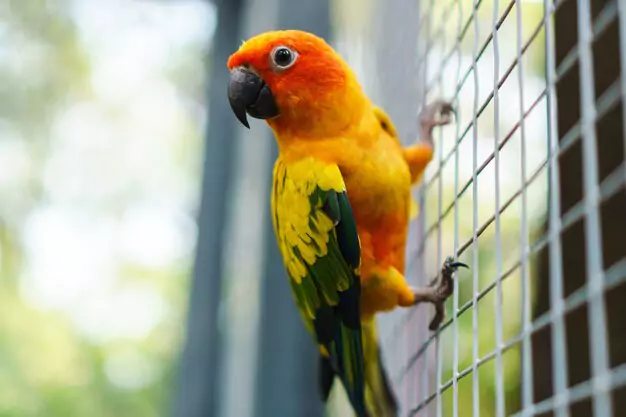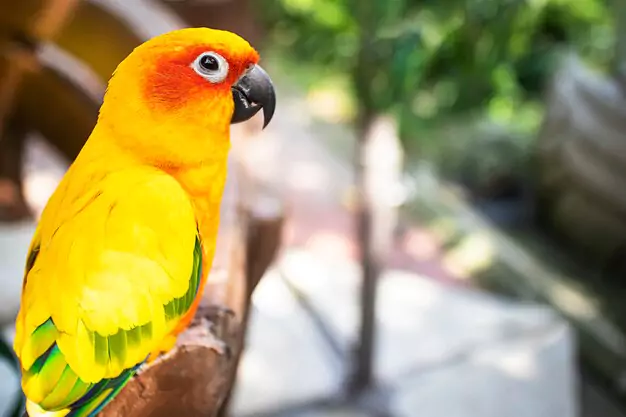Are you considering getting a sun conure parrot as your new feathered companion? These parrots are known for their vibrant colors, playful personalities, and social nature, making them excellent companions for those who have these birds in mind. As flock animals, they thrive in the company of others, so be sure to provide plenty of attention and interaction.
One of the most common questions potential owners of pet birds ask is, “Do sun conures talk well?” The answer is that it depends on the bird‘s mind. While some sun conures can learn words and phrases with ease and are known to be talkers among parrots, others may not be as vocal.
Regardless of whether or not your sun conure talks, these parrots make wonderful companions. They have big personalities and require plenty of attention from their owners to thrive. It’s important to keep in mind that they need love and affection, and a spacious cage to call home.
We’ll explore the behavior and care requirements of sun conure parrots, popular pet birds, to provide you with relevant information that will help you make up your mind about owning one.
Understanding the Talking Ability of Sun Conures

Sun conures are popular pet parrots known for their striking colors and playful personalities. One of the questions that potential owners may have is whether or not Sun conures can talk. While talking is not a natural behavior for these birds, with practice and a little patience, they can learn to mimic words and sounds. It’s important to keep in mind that each bird has its unique personality and abilities, so not all sun conures will be able to talk. If you love these birds and want more information on their talking abilities, it’s best to do your research and consult with experienced bird owners.
Talking Points
Talking is not a natural behavior for sun conures, but they can learn to mimic words and sounds with practice.
Unlike some parrot species like African Greys and other parrots, who are known for their exceptional talking ability, sun conures do not have a natural inclination toward talking. However, this does not mean that they cannot learn to mimic words and sounds with proper training. Many sun conure owners who love their parrots report success in teaching their birds to talk.
One important factor in teaching your parrot, such as a sun conure, to talk is consistency. It’s essential to work with your bird every day and use repetition when introducing new words or phrases. Parrots love learning new words and phrases, so starting with simple words like “hello” or “goodbye” before moving on to more complex phrases can be very effective.
Another important consideration is the tone of voice you use when speaking to your bird. Sun conures respond well to high-pitched, sing-song voices, so it’s worth experimenting with different tones and pitches when trying to teach them new words.
Some sun conures may only learn a few words or sounds while others may develop an extensive vocabulary.
Just like humans, individual sun conures will vary in their ability and willingness to learn new things. While some birds may only ever pick up a few basic words or sounds, others may develop an impressive vocabulary over time.
The key here is patience and perseverance with sun conure parrots. Don’t get discouraged if your sun conure parrot seems slow to pick up new words at first – it can take weeks or even months of consistent training before you start seeing results.
If you’re having trouble getting your sun conure parrot to talk, it may be helpful to enlist the help of a professional trainer. A trained expert can provide valuable guidance and advice on how to train your bird effectively.
The quality of a sun conure’s voice can also vary depending on the individual bird.
Just like humans, every sun conure has its unique voice and vocal range. Some birds may have clear, crisp voices that are easy to understand, while others may sound more garbled or muffled when speaking.
It’s important to keep in mind that just because your bird doesn’t have a perfect speaking voice doesn’t mean they’re not trying their best! With patience and practice, you can work with your bird to improve its enunciation and clarity over time.
Factors Affecting Talking Ability in Sun Conures

Sun conures are known for their vibrant colors, playful personalities, and ability to mimic sounds and words. However, not all sun conures have the same talking ability. Some may be more talkative than others, while some may not talk at all.
Genetics
Just like with humans, genetics play a role in a sun conure’s ability to talk. Some birds may be more predisposed to learning than others due to their genetic makeup. However, it is important to note that genetics are not the only factor that determines a bird’s talking ability.
Environmental Factors
Environmental factors such as socialization, exposure to different sounds, and amount of human interaction can also impact a sun conure’s talking ability. Here are some ways environmental factors can affect a sun conure:
Socialization: Sun conures exposed to other birds or animals from an early age may be more likely to learn how to talk.
Exposure to Different Sounds: Birds exposed to different sounds such as music or television may be more receptive to learning new words and phrases.
Amount of Human Interaction: Sun conures that receive regular attention and interaction from humans may be more likely to learn to talk.
Age
Age can also affect how well a sun conure learns to talk. Younger birds generally have an easier time learning new things compared to older birds. Therefore, it is recommended that owners start teaching their sun conures how to talk when they are young.
It is important for owners of sun conures who want their bird(s) to learn how to speak or mimic sounds/words must understand these factors affecting their pet’s speech abilities so they can provide the best environment possible for them.
When Do Sun Conures Start Talking?

If you’re a sun conure owner, one question that may be on your mind is when your bird will start talking. While sun conures are known for their ability to mimic sounds and words, the age at which they begin doing so can vary greatly between individuals.
Age Range for Talking
Some sun conures may start mimicking sounds as early as 3 months old, while others may not begin until they are over a year old. This wide range in age can depend on various factors such as genetics, environment, and training.
Patience and Consistency
As an owner, it’s important to be patient and consistent when teaching your sun conure how to talk. Repetition is key in helping them learn new words or phrases. You should also make sure to use positive reinforcement by rewarding your bird with treats or praise when they successfully repeats a word or sound.
Training Tips
Here are some tips for training your sun conure to talk:
Start with simple words: Begin by teaching your bird simple words like “hello” or “goodbye.” Once they have mastered these basic words, you can move on to more complex phrases.
Repeat often: Consistency is key when teaching your bird how to talk. Repeat the same word or phrase multiple times throughout the day.
Use context: Try using certain words in context so that your bird understands what they mean. For example, say “hello” every time you enter the room so that your bird associates that word with greeting someone.
Mimic their sounds: Birds learn through imitation, so try mimicking their sounds and repeating them back to encourage them to do the same.
Be patient: Remember that every bird learns at their own pace, so don’t get discouraged if yours isn’t picking up on new words right away.
Positive Reinforcement: Teaching Your Sun Conure to Talk

Sun conures are known for their playful and curious personalities, making them a popular choice among pet bird enthusiasts. One of the most impressive abilities of these birds is their capacity to learn and mimic human speech. However, teaching your sun conure to talk takes time and patience.
Consistency is Key
Consistency is essential when training your pet bird. It’s important to set aside time each day for training sessions, preferably at the same times every day. This routine helps establish a sense of structure and predictability for your bird, making it easier for them to learn new things.
Positive Reinforcement Techniques
Positive reinforcement techniques such as offering treats or praise can help encourage your son’s conure’s talking abilities. When your bird attempts to mimic words or phrases, reward them with verbal praise or a small treat. This technique reinforces the behavior you want to see more often.
Playtime as Training Time
Playtime can also be an excellent opportunity for training. Use toys that require interaction and communication between you and your bird. For example, use toys that make noise when touched or those that require manipulation with beaks or feet. Encourage vocalizations by repeating words or phrases while playing with your bird.
Avoid Forceful Training Methods
It’s important not to force your bird into talking; this can cause stress and hinder its progress. Instead, focus on creating a positive environment that encourages learning through play and socialization.
Toning Your Bird’s Voice
Toning exercises are another way to encourage vocalizations in your sun conure. These exercises involve mimicking sounds made by other birds or animals using different tones of voice while interacting with your pet bird.
Hand Training
Hand training is another effective method for teaching your son conure to talk. This technique involves using your hand as a perch while repeating words or phrases you want your bird to learn. Over time, your bird will associate the words with the presence of your hand and begin to repeat them.
Video Examples
Watching videos of other birds talking can also help encourage vocalizations in your sun conure. Show your bird videos of other birds talking and encourage them to mimic what they hear.
Adding to the Vocabulary: Words and Sounds Your Sun Conure Can Learn

Sun conures are known for their loud and playful personalities, but did you know that they also can learn a variety of words and sounds? Teaching your sun conure new vocabulary can be a fun and rewarding experience for both you and your feathered friend.
Start with Simple Words or Sounds
It’s important to start with simple ones before moving on to more complex ones. This will help your bird understand what you’re trying to teach them and build their confidence in learning new things. Some good starting points could include:
Names: Start by teaching your bird its name, as well as the names of other people or pets in the household.
Phrases: Short phrases like “hello” or “goodbye” can be easy for birds to learn.
Sounds: Birds are naturally drawn to sounds, so try teaching them simple noises like whistles or clicks.
Repetition is Key
Like with any type of learning, repetition is key when teaching your son to conure new words or sounds. Consistently repeating a word or sound will help reinforce it in your bird’s memory. Try saying the word or sound several times in a row during training sessions, and continue practicing regularly until your bird has mastered it.
Use Positive Reinforcement
Positive reinforcement is an effective way to encourage your son’s conure’s learning progress. When your bird successfully learns a new word or sound, reward them with treats, praise, or affection. This will help reinforce good behavior and motivate them to continue learning.
Teach Your Bird How to Say Its Name
One of the most rewarding things about teaching a sun conure how to talk is hearing them say their name. To teach your bird how to say its name, start by saying it slowly and clearly while making eye contact with your bird. Repeat this several times a day, and gradually start pausing after saying the name to give your bird a chance to mimic you.
Singing and Whistling
In addition to learning words and phrases, sun conures can also learn songs and whistles. Playing music or singing around your bird can help them pick up on different melodies and rhythms. You can also try teaching your bird simple tunes by whistling them yourself and rewarding them when they attempt to mimic you.
Care Tips for Keeping Your Active Sun Conure Happy and Healthy

Balanced Diet for Your Sun Conure
Sun conures require a balanced diet to maintain good health. They need pellets, fresh fruits, and vegetables in their daily diet. It is essential to provide them with occasional treats as well. A balanced diet can help keep your sun conure healthy and happy.
You can feed your sun conure with different types of pellets that are available in the market. You can also make your bird food by mixing different grains, seeds, and dried fruits. Fresh fruits like apples, bananas, grapes, kiwis, mangoes, oranges, papayas, pears, and pineapples are good for them. Vegetables like carrots, corn on the cob (cooked), green beans (cooked), peas (cooked), and sweet potatoes (cooked) should be included in their diet.
Regular Exercise Is Essential
Sun conures are active birds that require regular exercise to stay healthy and fit. Providing plenty of toys and opportunities for play is essential to keeping your sun conure entertained while also getting enough exercise.
There are many toys available in the market that you can buy for your sun conure such as swings, ladders, or ropes made from natural fibers like sisal or cotton rope. You can also give them puzzle toys which will keep them entertained while providing mental stimulation.
Proper Socialization Is Key
Proper socialization with humans and other birds is crucial to keeping your sun conure happy and mentally stimulated. Sun conures love attention from their owners; they thrive on it! So spending time with them every day is important.
It’s also important to introduce your bird to other birds gradually so they have time to get used to each other before being housed together permanently. When introducing new birds into the flock it’s best if they’re all around the same size so there isn’t any bullying or fighting over food or toys.
Tricks and Tips for Bonding with Your Sun Conure
Sun conures are known for their playful personalities and love to interact with their owners. Here are some tips to help bond with your sun conure:
Spend time with them every day, even if it’s just a few minutes.
Talk to them in a calm and reassuring voice.
Play games with them like peek-a-boo or hide-and-seek.
Offer treats as rewards when they perform tricks like stepping up onto your finger or saying hello.
Give them plenty of toys to play with and rotate the toys regularly so they don’t get bored.
Conclusion: Do Sun Conures Talk Well?

In conclusion, sun conures are known for their exceptional talking abilities and playful personality traits. While not all sun conures will talk, many have the potential to learn a variety of words and sounds with positive reinforcement training. Factors such as age, environment, and individual personality can affect a sun conure’s ability to talk.
To teach your son conure to talk, it is important to use positive reinforcement techniques such as offering treats or praise when they mimics sounds or words. Consistency and patience are key when teaching your bird new vocabulary.
In addition to basic phrases like “hello” and “goodbye,” sun conures can also learn more complex words and even mimic household noises like doorbells or phone rings. It is important to remember that each bird is unique in its learning abilities and preferences.
To keep your active sun conure happy and healthy, provide them with plenty of toys, social interaction, and a balanced diet consisting of fruits, vegetables, grains, and protein sources.
Overall, if you are looking for a pet bird that has the potential to learn how to talk well while also providing companionship and entertainment, then a sun conure may be the perfect fit for you.
FAQs
1. Can all Sun Conures learn how to talk?
Not all Sun Conures will learn how to talk; however, many have the potential to learn a variety of words and sounds with positive reinforcement training.
2. What factors affect the talking ability of Sun Conures?
Factors such as age, environment, and individual personality traits can affect a Sun Conure’s ability to talk.
3. When do Sun Conures start talking?
Sun Conures can start mimicking sounds at an early age but typically begin speaking between six months and one year old.
4. How do I teach my Sun Conure new words and sounds?
Positive reinforcement is key when teaching your Sun Conure new vocabulary. Offering treats or praise when they mimic sounds or words can encourage them to continue learning.
5. What should I feed my Sun Conure to keep them healthy?
A balanced diet consisting of fruits, vegetables, grains, and protein sources will help keep your Sun Conure happy and healthy. It is also important to provide plenty of toys and social interaction for mental stimulation.








